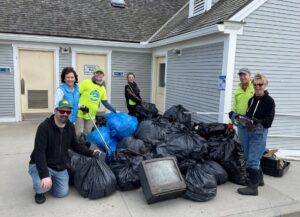 HYANNIS – A trip to a hospital emergency department can be a tipping point in an elderly person’s health.
HYANNIS – A trip to a hospital emergency department can be a tipping point in an elderly person’s health.
A study published in the Annals of Emergency Medicine last year found that six months after a visit to the emergency department (ED), even seniors who had not been admitted were 14 percent more likely to have a functional decline or disability.
The disabilities included difficultly dressing themselves, independently bathing, walking down a flight of stairs, shopping, managing finances or carrying a package.
“They become a vulnerable population,” said Falmouth Hospital Emergency Center Chief Robert Davis, MD. “The Cape is a retirement destination so there are a lot of elderly couples and people living by themselves who’ve been widowed or are widowers who don’t have a lot of family support. When we do discharge people, their support network may be slim and the family may not be around the corner to help out.”
General weakness and falls are the most common reasons elderly people end up in the ED, he said. Falls can have devastating complications. In a recent report from the Centers for Disease Control and Prevention, approximately one in four U.S. residents age 65 or older report a fall each year. Fall-related ED visits are estimated at approximately three million a year. In 2016, close to 30,000 seniors died as the result of a fall.
Even if they don’t die, their life becomes more difficult to navigate. For younger people, a broken arm or leg is an inconvenience that slows them down, but it does not significantly affect quality of life. The same is not true for those who are elderly, according to Dr. Davis.
A Design to Help:
In recognition of the unique needs of the Cape’s aging population, Cape Cod Healthcare in 2015 completely renovated and expanded the emergency departments at both Cape Cod Hosptial and Falmouth Hospital.
“One of our donors referred us to Mount Sinai in Manhattan and Saint Joseph’s in New Jersey who had dedicated geriatric emergency departments,” Dr. Davis said. “Early on in the process we realized that our old department didn’t service the needs of our patient population as well as we could.”
According to Dr. Davis, the upgrades to better accommodate seniors at the Cape’s two Emergency Centers included:
Acoustic tiles on the walls to absorb noise.
Using colors on the walls and floors that contrast in a way that makes it easier for those with vision problems, like macro degeneration.
Non-slip floors.
Natural light that is good for people’s circadian rhythms, especially at nighttime.
Thicker mattresses.
Stretchers that go lower so it’s easier to transfer patients.
More spacious rooms to accommodate family and friends.
“Nobody really goes to the emergency department by themselves,” he said. “Particularly in the summer, patients show up with a gaggle of people and we didn’t have the space for them. Now we not only have space, but it’s a comfortable space.”
The Next Step Towards Recovery:
To help patients recover more fully, the hospitals refer patients who need extra services to the Visiting Nurse Association of Cape Cod Hospice and Palliative Care for follow-up care.
“We have seen an increase in referrals directly from emergency rooms and that’s a good thing,” said Ann-Marie Peckham, president of VNA of Cape Cod. “It is a qualifier for a home care assessment and a lot of emergency rooms these days have case managers in the ER doing this kind of thing with discharge planning like they have traditionally done with admitted patients.”
Since so many emergencies happen in the night, the hospital faxes referrals to the VNA and they follow up the next morning. Very shortly afterwards they try to set up a clinical assessment, a functional assessment and a home safety evaluation.
These referrals are very important because it’s very common for people to decline after an emergency department visit, said Peckham. The VNA can also search for clues as to why the person ended up in crisis so they can prevent it from happening again.
“The first thing that we do is find out what is the patient’s goal,” she said. “What matters to you not what’s the matter with you?”
Sometimes the answer to that question is simple. It might be a woman who loves baking but will now have difficulty bending down to open the oven door or picking up a heavy pan. The solution can be as easy as a toaster oven on the counter.
“Our occupational therapists go in and they know about all kinds of adaptive equipment and alternatives to things we’re all used to using that are simpler,” Peckham said. “They work around the changes in people’s functional status.”
The VNA typically uses a team approach to each patient that can include:
Nurses to do a clinical profile and deal with medications and treatment.
Occupational therapists to make self-care and other activities easier.
Physical therapists to do endurance type exercises or work on a certain injury.
Home health aids to help with household chores.
Medical social workers to help access other resources in the community.
Speech therapists for those having trouble with communication.
Nutritionists to help plan a healthy diet.
Specialists in areas like wound care and diabetes to address specific issues.
Creating an individual plan for each individual patient is the home care division’s specialty.
“When we go into a patient’s home we know how they live,” Peckham said. “We know what matters to them. We know what’s keeping them going and what they’re proud of and that’s all important to quality of life. The thing that makes homecare clinicians different from clinicians in other settings is that we go into someone’s world and make that world continue to work for them.”























